Mother of two Vanessa Tan, 42, who has two children – daughter Megan Oh, 12, and son Tristan Oh, nine, – says her perception of school readiness has changed over the years.
Like many parents eager to give their kids a good head start, she sent her daughter to daycare when she was three. "She cried and cried everyday when we dropped her off and this went on for a month. Maybe she just wasn't ready for school but I didn't know it then," she says.
"Both my kids are in school now and I have come to understand that the ability to read, write and count is less important compared to life skills a child needs to have when he or she enters school."This includes communication skills with both teachers and peers, the ability to take instruction and not throw a tantrum, independence and articulating their needs," she says.

A businesswoman, Tan says parents also need to be school-ready. "Children are not the only people who need to adapt. Parents need to adapt to new routines and schedules and they need to be emotionally and mentally ready and stable for this. Parental anxiety will transfer on to kids and this will make the transition even harder," she says.
Tan says well-meaning parents may choose a school far from home which is of better standing than one that's near, but if commuting daily takes a toll on parents and the family, then it is difficult for parents to remain sane.
"If you spend so much time on the road, you would not have time to connect and nurture your children and help them understand schooling and the aspects surrounding it. If the routine is stretched, then families lose quality of life," she says.
Striking a balance
Journalism lecturer Assistant Professor Dr Jeyasushma Veeriah says that as a mother and educator, she believes that school readiness involves a balance between academic skills – like literacy and numeracy – and children's ability to regulate emotions, follow instructions and communicate effectively.
"While the ability to read and count forms the foundation for academic learning, self-regulation and communication are equally important because they enable children to adapt to the school environment. Both sets of skills should be nurtured hand-in-hand," she says.
As a mother to two teenagers aged 19 and 15, Jeyasushma admits that her view of school readiness has also evolved.

"When my children were younger, I focused more on academic readiness, ensuring they could recognise letters, numbers and shapes. However, as they grew older and faced challenges like peer pressure, managing emotions and building relationships and friendships, I realised that self-regulation and communication skills are very important in navigating life's challenges," she adds.
Jeyasushma says she has provided a solid foundation for her kids, focusing on both academic and communication skills while also preparing them for social challenges like peer pressure.
"However, if I were to make a minor adjustment, I might have started conversations about handling peer influence even earlier," says the Xiamen University Malaysia lecturer.
In her line of work, she says, she has encountered students who struggle with basic skills like following instructions, time management and communication of their ideas. "I believe these challenges stem from early childhood experiences; either these skills were not emphasised enough, opportunities to develop them were missed or they were not exposed to the language used," she says.
Her advice to younger parents is to embrace balance. "While it's tempting to focus on academic, never overlook the value of play, communication and emotional development. It is important for parents to help their children build confidence in expressing themselves, following routines and forming healthy relationships," she adds.
"The goal is not only to prepare them for education, but to equip them with skills they can use for life," she says.



